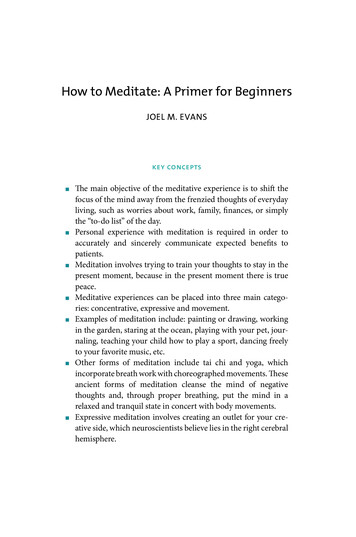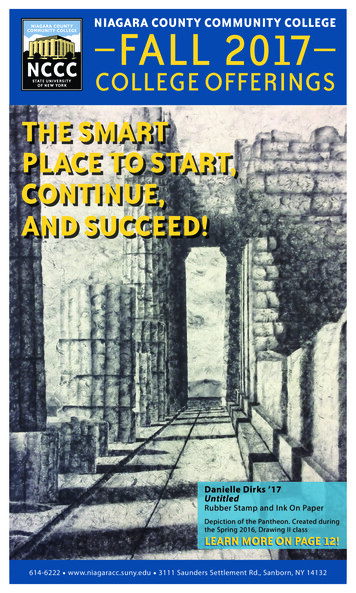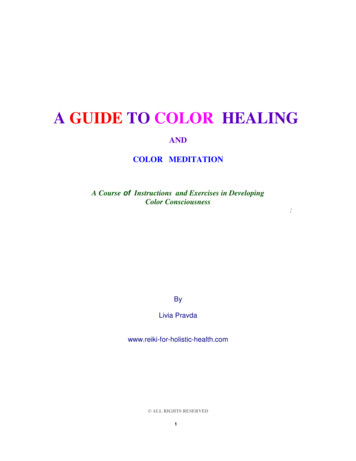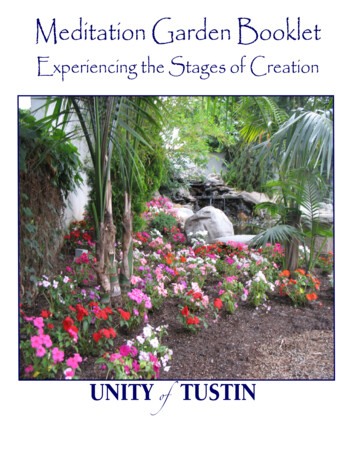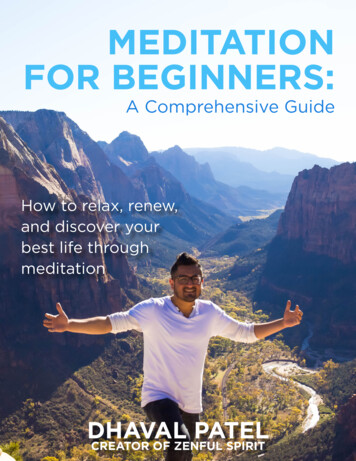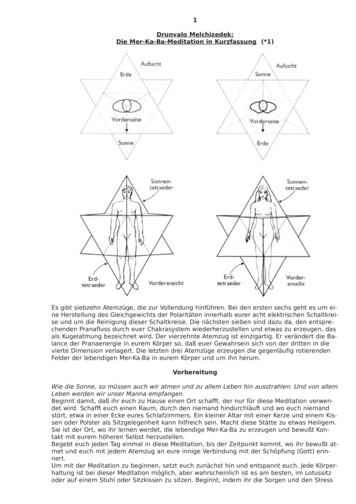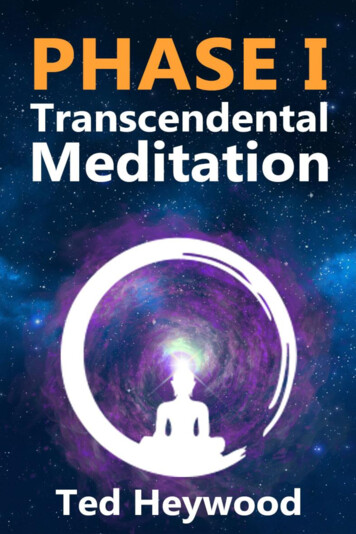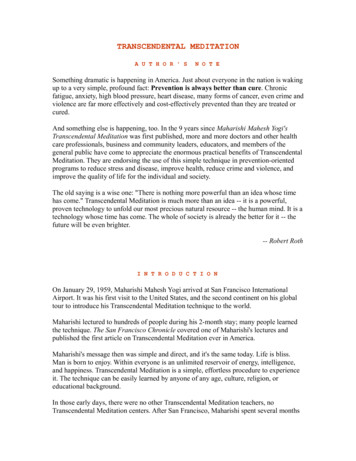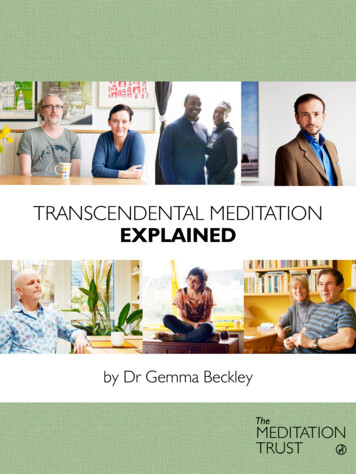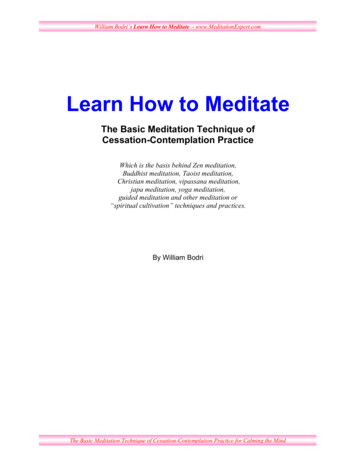
Transcription
William Bodri’s Learn How to Meditate - www.MeditationExpert.comLearn How to MeditateThe Basic Meditation Technique ofCessation-Contemplation PracticeWhich is the basis behind Zen meditation,Buddhist meditation, Taoist meditation,Christian meditation, vipassana meditation,japa meditation, yoga meditation,guided meditation and other meditation or“spiritual cultivation” techniques and practices.By William BodriThe Basic Meditation Technique of Cessation-Contemplation Practice for Calming the Mind
William Bodri’s Learn How to Meditate - www.MeditationExpert.comLet’s Begin Learning How to Calm Our MindsEveryone is looking for a way to still their thoughts, shed their worries, and attainmental peace.That’s the purpose of meditation!There are all sorts of meditations in the world that can help you learn how tocultivate a peaceful mind. There are lots of them!Basically, from one angle or another they work using different principles ofmental pacification but they all equally involve teaching you how to detach fromthe thoughts and impulses in your head (and in your body) that normally botheryou, distract you and impel you.When you learn how to detach from thoughts and separate from their distractingpull on you, those wandering thoughts in turn will naturally die down.What you learn to access through meditation is therefore a mind empty ofstressful thoughts and impulses that keep you unsettled and impel you downwrong courses of action. The very first step to this process is awareness, andyou cultivate awareness by watching your thoughts and your mind.You cultivate awareness through meditation.SURPRISE! Confucius was actually one of the people who taught the steps of this process inthe most detail. He said the first thing to cultivate, when dealing with every facetof life -- and not just spiritual or character development -- was mental“awareness.” When you could finally start seeing your own thoughts because ofpracticing meditation, then Confucius said you could achieve the next step of theprocess, which was “stopping.”In other words, awareness of thoughts -- shining a light on them without givingthem energy -- eventually causes the on-going mental chatter of ours to have its“volume turned down” to where you reach a mental state of cessation, orstopping, which is a clean mental realm absent of thoughts.The Basic Meditation Technique of Cessation-Contemplation Practice for Calming the Mind
William Bodri’s Learn How to Meditate - www.MeditationExpert.comWhen thoughts aren’t there, you aren’t impelled by them, and this is the firstnatural consequence of the practice of meditation. In Confucianism, wanderingthoughts were always called “desires” so the idea was to practice meditation, ormental introspection, to detach from desires.Of course, initially the mental state of peace you reach through meditativewatching of the mind is erratic, but with continued practice at meditation itbecomes relatively constant and stable and you become mentally FREE.So if you practice reaching and staying in this state of mental resting withcontinued awareness, an amazing thing will happen. After you learn mentalstopping and actually start achieving it, then you can achieve a degree ofsomewhat stable mental stillness.This stillness will be an ever-present quietude accompanying all you do becauseyour mental calm is becoming deeper and ever-present. Achieving stillness istherefore the third step of the meditative process.First you have awareness, then stopping, and then stillness which is almost, butnot quite complete. If you keep cultivating this stillness through meditation, it willexpand so that you achieve the fourth step of the path, which is a state of truepeacefulness.That’s a state that Eastern sages call “samadhi.” It’s a stage of deep mentalquietness or calmness. This is really a state of true quietness and it’s one of thethings you are after. It’s a state of spiritual development and a state of humanaccomplishment. In meditation, you want to reach a state of samadhi or deepmental calming and quiet.Taking a mental break or mental vacation, and staying in that state of deep,empty calmness with awareness, will also do something else. It will cause allyour vital energies to arise in your body. It’s just a natural function of the universethat emptiness, quiet or stillness gives birth to activity (the Chinese say “yin givesbirth to yang”).Therefore when you let go of your thoughts so that they calm down to quietness,the vital energies of your body that are normally suppressed will start to rise withactivity. When they arise they will start transforming your body so that it feels“blissful,” which is similar to the Western idea of Christian grace being bestowedupon someone. It’s all a function of cultivating a quiet mind.Actually, this stage of natural energy transformation refers to a state of bodymind cultivation wherein there is constant physical renewal since your mentalThe Basic Meditation Technique of Cessation-Contemplation Practice for Calming the Mind
William Bodri’s Learn How to Meditate - www.MeditationExpert.comrealm is all quiet, your physical energies are all active, and they are transformingyour body.Modern science doesn’t describe the results of meditation this way, but theschools of Hinduism, Sikhism, Taoism, Buddhism, yoga, Tantra, and so forthcommonly state that this is what happens. Even Confucianism says that yourbody will “feel like Springtime” because it is becoming renewed and rejuvenatedthrough meditation.Various meditation schools say it will become light, peaceful and blissful infeeling which are all the same thing.Modern science has not yet gotten around to investigating this experience, whichis commonly reported by many meditators, but only describes the minor effectsthat meditation produces in the body, such as the following: During meditation, oxygen consumption drops by 10 to 20 percent and itproduces a deeper state of rest than sleep. In fact, 75 percent ofinsomniacs were able to sleep normally when they meditated Meditation is the only activity that reduces blood lactate, a marker ofstress and anxiety. Meditation decreases the stress hormone, cortisol, and increases thecalming hormones melatonin and serotonin. Meditators secrete more of the youth-related hormone DHEA as they agethan nonmeditators. Meditating 45-year-old males have an average of 23percent more DHEA than nonmeditators, and meditating females have anaverage of 47 percent more. Wow! DHEA is one of those supplementspeople describe for anti-aging benefits because it lowers stress, heightensmemory, preserves sexual function, and helps control weight. Meditation has a profound effect upon three key indicators of aging: (1)hearing ability, (2) it lowers blood pressure, and (3) helps close objectvision. Long-term meditators experience 80 percent less heart disease and 55percent less cancer than nonmeditators. That's a good reason to startmeditating. (Psychosomatic Medicine 49 (1987): 493-507).The Basic Meditation Technique of Cessation-Contemplation Practice for Calming the Mind
William Bodri’s Learn How to Meditate - www.MeditationExpert.com 34 % of people with chronic pain significantly reduced their painmedication when they began meditating. Meditation is known to produce "spontaneous remissions" in 10% ofcancer cases, can help get rid of psoriasis, and is a great way to reduceblood pressure. It also is a critical component of alcoholic anonymousprograms and other programs to help people beat addictions.At first when your vital energies arise because of meditation it will seem as if thebliss-bestowing flow is just a trickle, but eventually so much vital energy will arisethat its fullness will give you energy, mental clarity, it will banish depression(because it’s the very antithesis of depression) and the energies that arise willactually transform your physical body.Science has already reported that meditation affects the physical nature, so it’sno great leap to learn that meditation can help rejuvenate the body and curedisease.Since these physical transformations happen simultaneously with the cultivationof deep mental peace, or quiet, and it’s the fifth stage of the meditation path. Thisis what many people are after, but it’s still only an incomplete result of meditationpractice.After attaining these prior six achievements of meditation practice, Confuciustaught that you then reach the sixth stage, which is that your natural wisdomcomes out in all situations and you attain “right knowing.” Your mind is alwaysdisciplined in quiet, and you can understand things naturally and effortlesslyknow the right course of action and how to react properly for all situations. You’realways disciplined in right discipline, and your behavioral response to anycircumstances are always correct.After attaining wisdom, Confucius said you could finally achieve the seventh stepof meditation practice, which is attainment or obtainment. Your mental realm willso open up that you will be able to obtain or do or achieve whatever you set yourmind out to do. You will be able to achieve any goal you desire in the world butmost of all, you will become able to fathom the true nature of your mind.Confucius called this whole set of meditation steps the great learning, whichmeant learning how to become “the real man,” or “real human being.” He saidthere are seven overall steps to this process.The Basic Meditation Technique of Cessation-Contemplation Practice for Calming the Mind
William Bodri’s Learn How to Meditate - www.MeditationExpert.comIn review, the first and second steps include “knowing” and “stopping.” You haveto first know how to stop the mind in order to stop, so we can say that you haveto follow some meditation practice to learn how to let go of thoughts and arrive atthe mental station of cessation.The “stopping” Confucius mentioned is described by many meditation schools asthe mental cessation of bothersome floating thoughts.All meditation practices are actually built upon the universal principles ofcessation-contemplation wherein you practice watching, observing, awareness orviewing of thoughts to reach a state of cessation (a state relatively absent ofthoughts) and once you reach the state of cessation you still have to practiceobservation, watching or awareness of the empty state that’s unveiled. InChristianity, this mental meditative practice is actually called “contemplation.”From knowing and stopping (cessation and contemplation) you can attainsamadhi, so by depending upon these two principles in meditation practice youcan reach Confucius’ goal of eventually attaining samadhi. With samadhi you willachieve the fifth state of physical peace, bliss, grace or comfort which involvesdeep transformations of the physical body.With a peaceful mind and blissful body achieved, you will then have developed agood foundation so that the deep wisdom of being able to know and see thingsclearly arises. This is true knowing or wisdom awareness or transcendentalwisdom, and this ability arises when you cultivate samadhi.Lastly there is the final Confucian step of attainment, which equates withuncovering your true nature and unveiling the real human being, the perfectedindividual underneath it all.And it all comes from simple mental resting! It all comes from the practice ofmeditation.Will it happen right away?No. The results of meditation follow the simple formula that applies to anylearning or attempted mastery of human endeavor:Practice Method Effort Time Patience Results.People think these seven steps only apply to meditation but these steps readilyapply to worldly affairs as well, and thus, the Confucian road of meditation andmental introspection -- of watching thoughts and “letting go of ties that bind” -- isThe Basic Meditation Technique of Cessation-Contemplation Practice for Calming the Mind
William Bodri’s Learn How to Meditate - www.MeditationExpert.comsomething that can be used to guide your daily life. It’s a habit we should eventeach to children, as I have mentioned in my book, Socrates and the Path toEnlightenment.For instance, most people must learn when and how to stop things when theyhave gone too far -- such as stopping talking or drinking or moving or whatever -and this particular skill equates with knowing when and how to stop. Dealing withan addiction or some form of abuse is really learning how to stop.First you must cultivate awareness, and then you must cultivate the ability tostop. You might need all sorts of assists to help you learn stopping, which is whythere are all sorts of methods in the world to assist you with any endeavor, butyou still have to master stopping, which you CAN achieve over time.So of course we have this fundamental problem of actually learning how to stopour thoughts even though we already know of this fundamental need. That’swhere meditation comes in!The failure to enter a state of mental tranquility is all because people do not knowhow to stop their thoughts, or even knowing how to stop, they will not or cannotapply their understanding of cessation to the situations that arise.They do not learn how to let go of thoughts or concentrate single-mindedly onmental quiet so that nuisance situations can be ignored and bothersomethoughts can be discarded.They do not know how to stop hanging onto the thoughts and since they neverlearn how to detach from mental pushes, cannot let them die down so that theycan achieve mental peace and natural physical bliss.People are always supplying their thoughts with extra energy without letting themleave gracefully. It is not so much that thoughts are wrong, per se, but that youshould not hold onto them and let this attachment blind you and misdirect you.It is this clinging to transient thoughts that leads people into all sorts of troubles.Our natural state is to be peaceful and happy until we disturb it. Meditation helpsus retrieve that naturally underlying mental state without pollutants
Meditation is known to produce "spontaneous remissions" in 10% of cancer cases, can help get rid of psoriasis, and is a great way to reduce blood pressure. It also is a critical component of alcoholic anonymous programs and other programs to help people beat addictions. At first when your vital energies arise because of meditation it will seem as if the bliss-bestowing flow is just a .
